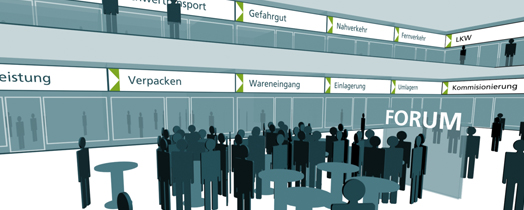Key Project 2 - Cloud Service Engineering
The value creation in logistics is shifting more and more from basic logistics services to value-added logistics services, which often require extensive support from information technology systems. To make these supporting IT systems as flexible as possible, it makes sense to map them to isolated logistics IT services based on their technical functionalities. These services can then be linked to hybrid value-added services or logistics processes with different basic logistics services.
The implementation of the technical functionality of new logistics IT services is the focus of the tools that are built on the basis of the Service Engineering Framework for logistics IT solutions. These tools have to be designed in such a way that they use the business ontology of logistics and integrate them in the services to be generated. The business objects defined in the business ontology, which will be referred to by the logistics IT services to be developed, have to follow the predefined ontology. As part of the development of a logistics IT service, the tools must have objects that conform to the ontology so that their instantiation is implemented with reference to the service to be developed.
Cloud-based development tools are needed in order to provide small and medium-sized enterprises, in particular, with a comprehensive development environment that makes it possible for them to generate cost-effective logistics IT services. These tools should facilitate the development and implementation of the technical functionality of the logistics IT services to be developed. To do this, software platforms can be used in the cloud that are not too costly for a small Mall and medium-sized IT company to purchase and operate. By taking this approach, the implemented services will also be compatible with the business ontology of the application domain and the Logistics Mall.
The goal of the research and development work in this key project was to provide a modular and configurable development platform for logistics IT services with standardized basic functionality that supports a cloud-based development of these services. SOA platforms based on, for example, SOAP, J2EE or .NET form the basis for providing the required methods and tools for engineering the cloud-based logistics IT solutions. These platforms include a runtime environment, a collection of class libraries, and services.
The challenge that arises is that numerous platforms, which have to exist alongside each other in the cloud and be integrated with each other, have to be integrated in their existence and their interactions. This integration is very time consuming and complex. The high degree of complexity acts a big barrier for small and medium-sized software companies thinking about getting into cloud-based software development. It is already a difficult task just to set up a platform to be used for cloud-based software development. To do this, a decision has to be made if directory services will be provided or where these services will be made available. Another question that has to be answered is what platform technology will the developed service run on?
The requirements described above also had to be supplemented with non-functional requirements, which needed to be defined and met. These requirements included security, data management, performance, and scalability. In addition to providing tools for developing logistics IT services, the project team developed a suitable platform architecture for engineering cloud-based logistics IT solutions.
 Fraunhofer-Institute for Material Flow and Logistics IML
Fraunhofer-Institute for Material Flow and Logistics IML